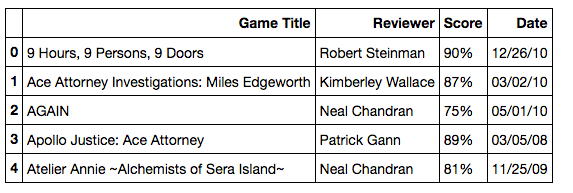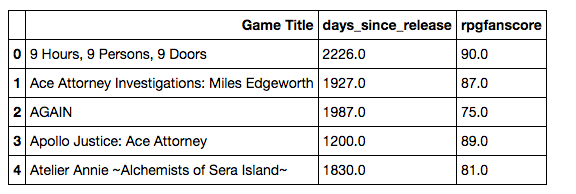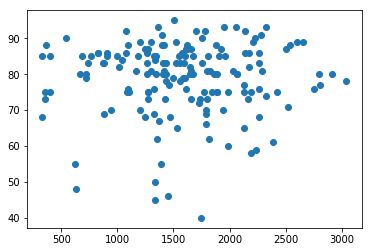(an older post migrated from my Medium blog)
So I have been frequently traveling on trains lately and that means…loads of time to waste watching trees and cows and sheep … or to play some games perhaps on my Nintendo DS.

So while I was trying to best my New Super Mario Bros high-score I thought : “Wait a minute!!! I am sure I could find a list of games in one of the website I frequent somewhere with release dates and scores…”
Perhaps I can test a hunch that I have (ok ok … a hypothesis) that there is a relationship between scores in reviews and how late to a console life-cycle an RPG game has been released. I wanted to test some pandas functionality too so I started coding a small script.
One of my favorite sites for RPG games has been RPGFan. I consider its reviews trustworthy and they cover all kinds of consoles and platforms.
So I decided to scrape the Nintendo DS section of the reviews. Decided to use the .read_html() method from pandas.
By providing some help and with some experimentation I got the data I wanted by doing this:
.png)
By providing a hint (match=”Game Title”) , by specifying that the first row is the header and by taking the last table [-1] from the list of tables I got from .read_html I had all the data necessary. Here are the first 5 rows that .head() is giving me:

Now this might look easy. Its because pandas .read_html() made it easy to be able to transform an HTML table to a dataframe. Believe me when I say that you want to have these kinds of helper functions when you can since parsing HTML tables is a boring thankless task.So thank you pandas developers!
Anyway… I still needed to make the data more suitable for analysis. What I wanted was the time difference from the day the DS console was released (21-Nov-2004) to the date the game was reviewed. Its pandas time again:
.png)
Firstly I convert the Date column I got from the site into the datetime type from Pandas. Then I create a variable called days_since_release which took a timestamp of the date of the release and found the difference between that and the review date available in datetime. Then I use the dt.days accessor in order to get the number of days out of that and then convert it into a float.

OK. Now the dates are fine but I want to do something with the score since I had it as a string in percentage format. Also I want to clean up a bit, and drop all columns I don’t really need by defining the ones I want to keep and keep only those.Again pandas to the rescue
.png)

So now I am ready for some plotting . I also want to check if these variables are correlated at all:
.png)
Well while the scatter plot could perhaps allude that there could be a relationship between the two variables

… correlation between the two variables is close to zero!
array([[ 1\. , 0.02188139],
[ 0.02188139, 1\. ]])
So… the answer to the title question is “No its not so easy ! There seems to be no correlation between the score of a DS RPG game and how far into the console’s lifecycle the game was released”.
However it was a good excuse for trying some stuff out … I wanted to try to use the pandas .read_html() method since it simplifies a lot webscraping once you get what you want after a bit of trial and error.So… not all is lost. A fine way to waste time on a train journey. 😊
Now while this holds for Nintendo DS RPG games , I wonder if that is the case for ALL the consoles… 😉
btw the code for this can can be found on a github gist here
TM
